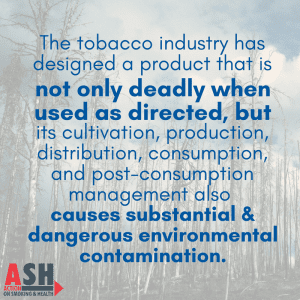By Clif Curtis
For decades now, with cigarette sales having increased to more than six trillion in 2016, tobacco producers have refused to accept any significant responsibility for the serious, global environmental damage resulting from the production, use and disposal of tobacco products. It’s time for new regulations that hold the tobacco industry responsible for contaminating the environment, humans, and animals throughout tobacco’s lifecycle. 
Tobacco leaf growing and processing involves heavy pesticide and petroleum-based fertilizer use, land degradation and deforestation. Added waste concerns arise from tobacco manufacturing, packaging, distribution and consumption. These concerns include production of greenhouse gases (C02 and methane), released by manufacturing, transport and smoking of tobacco products; environmental toxins found in secondhand smoke; newly described toxic residuals known as third-hand smoke found attached to surfaces in homes and other enclosed environments where smoking has occurred; and post-consumption toxic tobacco product waste (TPW).
Given experience involving industry acceptance of responsibility by the pesticide, paint and pharmaceutical industries, among others, a strong case can be made for the tobacco industry being responsible for serious environmental problems throughout the tobacco product lifecycle. With butt waste being the most visible lifecycle harm, the tobacco industry clings to its long held view that smokers and local communities are responsible for post-consumer waste. The industry tries to bolster its image by funding some beach cleanups, Keep America Beautiful, and ash trays. Those downstream actions are miniscule compared to the up-to four billion butts polluting the globe annually. The tobacco industry has designed a product that is not only deadly when used as directed, but its cultivation, production, distribution, consumption, and post-consumption management also causes substantial and dangerous environmental contamination.
Extended Producer Responsibility (EPR) is a policy principle that promotes environmental protection by extending the responsibilities of the producer across the products entire life cycle. As set out in a Swedish doctoral thesis on corporate responsibility by Thomas Lindhqvist in 2000, EPR addresses two core tenets that are highly applicable to tobacco:
- Internalizing the environmental cost of products into the retail price; and
- Shifting the economic burden of managing toxicity and other environmental harms associated with post-consumer waste from local governments and taxpayers to producers.
While Extended Producer Responsibility (EPR) is put forward as a legislative approach, it asserts, in the context of tobacco, that the producer would be strictly liable for tobacco product waste. There are several legal theories pertaining to liability, involving potential legal causes of action that also could be applicable. Public nuisance may be the strongest approach, although product liability or hazardous waste laws could successfully hold tobacco producers liable for tobacco product waste.
Raising awareness about the environmental impacts and harm of tobacco and the responsibility of the tobacco industry for those consequences will require media messaging, PR skills, donors to help advance our agenda, and actions by governments at national and subnational levels, in order to succeed. In support of Article 18 of the Framework Convention on Tobacco Control (FCTC), the World Health Organization (WHO) is in the final stages of developing a detailed “Overview” on tobacco and its impacts on the environment. Its release is anticipated to occur on World No Tobacco Day, May 31st, and should be accessible at www.WHO.int.
More broadly, these and other initiatives will provide opportunities to motivate and collaborate with a diverse array of stakeholders in ways that will benefit environmental protection, as well as quality of human health, while increasing the cost of tobacco and reducing tobacco use. This EARTH DAY 2017 blog serves as one of many actions that are needed to protect our global environment, in tandem with a focus, going forward, on promoting a sustainable and healthy planet for all of us.
__________
Clif Curtis serves as a Consultant Policy Advisor for ASH and is the CEO of the Cigarette Butts Pollution Project. He was CEO of the Oceanic Society in the 1980s, a Senior Political Advisor for Greenpeace Int. on oceans and sustainable development in the 1990s, Director of WWF Int.’s Global Toxics program in the 2000s, and a consultant more recently focusing on tobacco control with an emphasis on tobacco’s environmental impacts.